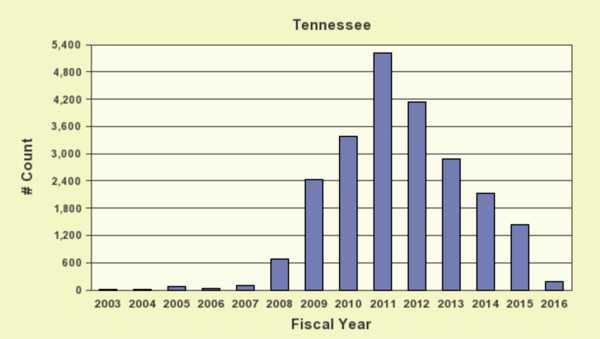
Editor’s note: This end of this story has been corrected to explain that country-of-origin information is collected by Metro police at the time of arrest, but is not gathered into reports.
One of President Donald Trump’s executive orders threatens to withdraw federal funding from so-called “sanctuary cities” — places that are explicitly welcoming to immigrants and refugees, and where officials often refuse to cooperate with federal immigration enforcement.
Nashville isn’t a sanctuary city. But leaders have adopted several immigrant-assistance policies, and they’re hearing mounting pressure from activists to move in that direction.
At the same time, Tennessee law bans sanctuary cities.
How Metro Assists New Americans
Nashville has created programs to aid new Americans.
Schools offer mentors to foreign-born families. City librarians help newcomers apply for citizenship. And the city created a multi-lingual phone service
to explain government documents.
Mayor Megan Barry, and her predecessor, Karl Dean, tend to describe Nashville as “warm and welcoming” to immigrants — stopping short of the “sanctuary” term.
“My Christian faith teaches me to welcome the stranger,” Barry said in a speech Monday. “And I believe that’s what Nashville and the United States should continue to do. We should do it because it’s morally right, and because it creates a stronger and safer America.”
Barry argued that fear of deportation — when it makes families afraid to send children to school, or stops crime victims from coming forward — makes the city less safe and less prosperous.
The Key Conflict: Deportations
If there were a sanctuary city litmus test, it would be how local police and jails interact with federal Immigration and Customs Enforcement, or ICE. And that relationship is what activists confronted the mayor about
at a rally on Sunday.
The mayor had started to address how Nashville police won’t be made into “immigration officers,” when shouts overpowered the amplifier.
“They already are!” was the cry from several in the crowd. Several protesters charged that local authorities are complicit in ICE actions.
“No, they’re not,” Barry repeated. “They’re not going to do it.”
Yet the protesters did not relent. And the next question from a protester exposed a deeper tension: “Can we stop deporting people from the Nashville jail?”
Barry replied. “What I need you to do is help me with the elected sheriff. That’s his purview.”
In that moment, the mayor shifted attention to Davidson County Sheriff Daron Hall, who has been criticized for years by immigration advocates.
In Nashville, the police department is responsible for making arrests and the sheriff for operating the jails. Barry says that she and the police chief agree that “immigration status is irrelevant to any [Metro police] activity or duty.”
But there have been more tensions between her office and the sheriff.
Nashville Cooperates With ICE
Here’s the way Hall said deportations have taken place for years:
Jail guards don’t flag inmates to ICE. Instead, they share booking records with state and federal agencies, and those agents can search for undocumented immigrants who have been criminally charged. ICE can send what’s known as a detainer request to hold an inmate.
In the past two years, ICE has come to Nashville to pick up 1,042 people.
“ICE, on their own, look into the individuals,” Hall said. “The main thing I would want to be clear about is that we haven’t changed because of [Trump’s] executive order and we’re still living under what was the Obama administration’s policy.”
That policy is known as the Priority Enforcement Program. It has changed names while maintaining a similar arrangement.

Research out of Syracuse University has found that out of nearly 7,000 detainer requests since 2003, Nashville authorities have almost always complied.
Other cities, like San Francisco, routinely refuse to cooperate. Officials there are now under intense scrutiny.
Weighing A ‘Sanctuary City’ Status
While
campaigning for mayor, Barry said sanctuary status wasn’t on the table. But while sidestepping the label, she has insisted on welcoming policies.
That approach could draw less attention from the Trump administration. The
recent executive order gave special attention to sanctuary cities, which will be required to collect data on “alien crimes” or risk funding cuts.
Should such a rule apply in Nashville, Metro police said it would be difficult to conduct.
When issuing citations, police fill in information about place of birth, but department leaders said that officers do nothing to verify that information. And police said they don’t track country-of-origin data or trends.


